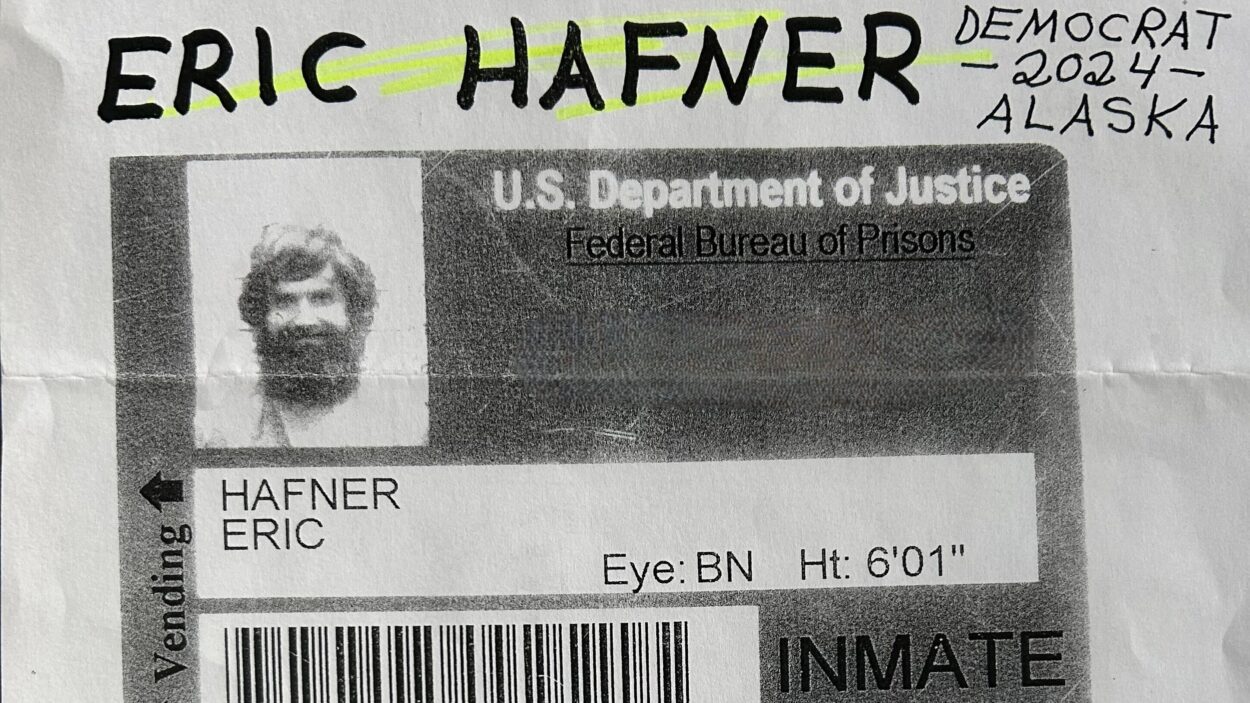
Three candidates running to unseat Alaska Democratic Congresswoman Mary Peltola this November have advanced to the general election ballot. That’s out of 11 candidates that entered the race ahead of the primary.
Republicans Nancy Dahlstrom and Matthew Salisbury withdrew before Monday’s deadline, allowing fifth-place candidate John Wayne Howe of the Alaskan Independence Party and sixth-place Democrat Eric Hafner to advance to November’s contest. Each received less than 1% of the vote.
Campaigning for statewide elected office in Alaska can be difficult and expensive, but Hafner faces extra hurdles. For one thing, he’s never been to the state. For another, Hafner is currently serving a decades-long sentence in a medium-security federal prison near Otisville, New York.
Ahead of the primary, Hafner announced his candidacy to KRBD in June with a letter. It was a photocopy of a prison ID card with “INMATE” in big block letters in one corner and in the other, a smiling man in his thirties with a long, bushy beard. Underneath, written in Sharpie, highlighted and underlined: “Eric Hafner, Democrat, running for US Congress in Alaska from federal prison!”
The phone system in federal prisons only allows 15 minute calls before they abruptly cut off. Hafner is not a fan.
“Trying to communicate here, where you have 510 minutes a month with this phone system here, you don’t have access to the internet. Those are major hurdles,” he said a few weeks before the primary.
Hafner was sentenced to 20 years for threatening a series of politicians, police, judges, and attorneys in New Jersey while living outside the country. According to the indictment, a day after he caught a flight from Hawaii to Tokyo, he called a police department in Monmouth County and said an officer there should be shot. The officer had arrested Hafner on a juvenile complaint when he was 16.
For the next two years, while living in Ireland, the indictment said Hafner continued what a New Jersey U.S. Attorney at the time called a “campaign of terror” against a number of officials linked to petty cases he faced as a teenager. Hafner said authorities arrested him at a U.S. airport on the Pacific island of Saipan.
“I’m innocent of all charges. I deny all allegations,” Hafner said over the crackly prison phone line. “You’re throwing a 20 year sentence at me for an allegation that would be, on average, about a 24 month federal sentence. I think it’s pretty clear the whole thing is a political stitch-up.”
A federal jury, however, took a different view. He was convicted in 2022.
Hafner said his past shouldn’t scare off potential voters — after all, he said, he’s not the only one on the ballot with a criminal record.
“You have Donald Trump, who is a convicted felon, who is on the top of the Republican ticket,” Hafner said.
Hafner is running as a Democrat, and his message seems to align with key parts of the party’s platform. Hafner said the nation’s credibility on the international stage is “in tatters,” and the gap between rich and poor is “widening at an alarming rate.”
So, how is it that Hafner can even run for a seat in a state he’s never been to?
Turns out, according to the U.S. Constitution, you don’t actually need to live in the state you’re running from until Election Day.
“I think I have a very good reason right now that I simply can’t come to Alaska,” Hafner explained.
Hafner could, thus, run for office anywhere. But why Alaska?
“Alaska is a very unique place with the climate change issues, with the Indigenous issues that are in Alaska, but also the very vast opportunity for positive development and progress,” Hafner said.
Hafner said he’s been running his campaign himself — though, his mom told KRBD in an email that the prison has been experiencing a series of lockdowns recently, which is complicating things. His mom and de facto communications director is Carol Hafner who challenged Don Young for the very same seat in 2018 while also living out of state.
Hafner himself has run for Congress twice before: in Hawaii in 2016 and in Oregon two years later. Both times, he was living out of the country.
Hafner still has about 15 years on his sentence but he said — with the help of Alaska voters — he doesn’t think that will be a problem.
“Ultimately, if I’m elected, I expect to be released immediately at that point. There’s a federal statute under compassionate release that says you could be released for extraordinary compelling reasons. And, by golly, if I’m going to DC to represent the people of Alaska, I think that’s a very extraordinary and compelling reason,” Hafner said.
Maybe the reverse is also true — getting out of prison could be an extraordinary and compelling reason to run for Congress. But Hafner claimed it’s more than that.
“My vision is for Alaska to be a place where arts, culture and higher education are the mainstay industries, in addition to fisheries,” Hafner said before the prison phone call reached its 15-minute limit and was cut off.
This story has been updated. It was originally published August 2, 2024.





